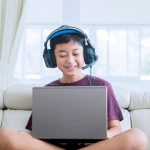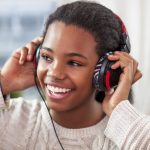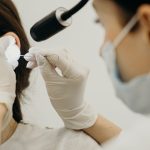Many new parents find themselves questioning their child’s growth and development, particularly in regards to hearing and speaking. Focus spoke with Dr. Michael S. Cohen, Director of the Mass Eye and Ear Multidisciplinary Pediatric Hearing Loss Clinic, who answered some frequently asked questions that he receives from new parents.
What should a baby typically hear at birth?
An infant’s hearing develops while still in the womb. Babies have been shown to respond to their voices and other sounds during the third trimester of pregnancy. At birth, the hearing system is fully developed and can be accurately tested.
During the first few months of life, babies begin to associate the sounds they hear with the things they see; a concept known as audio visual coherence. Dr. Cohen explained this is how a baby’s brain can link sight and sound at an early age. Infants, even as young as 4-months-old, can connect what they are hearing to what they are seeing. By 10-12 months, they can figure out who is talking by looking at faces.
“Although babies typically start talking at 12 months of age, hearing and making new neural connections really takes off as soon as you’re born. This is why it is so important to catch hearing loss as early as possible,” Dr. Cohen told Focus. “Early intervention improves hearing and language outcomes for any child with hearing loss. It makes a big difference if you detect hearing loss at 2 to 3 months old versus 2 to 3 years old.”
Newborn hearing screening is mandatory in all states in the U.S. This is typically done in the hospital within the first few days of life. Babies that do not pass the newborn hearing screening should have follow-up testing to determine the best next steps.
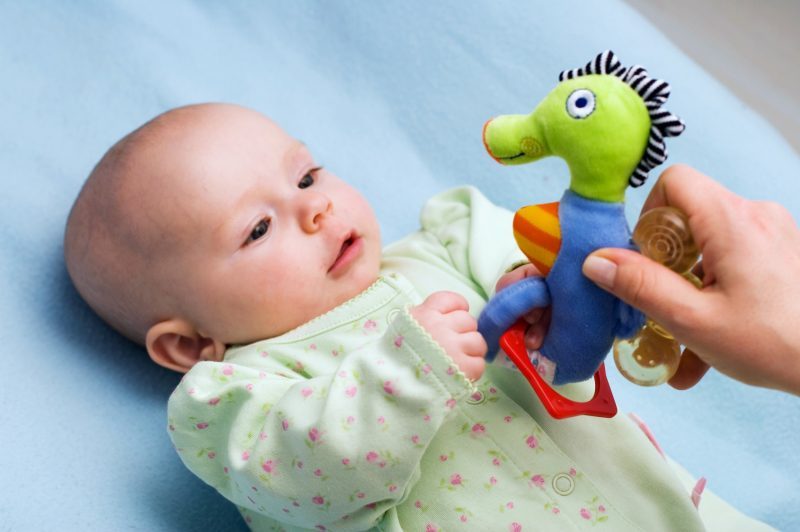 What happens if my baby doesn’t pass a newborn hearing screening?
What happens if my baby doesn’t pass a newborn hearing screening?
The newborn hearing screening checks for signs that your child may or may not be hearing normally. It is a pass/fail test, and uses clicks to determine if the baby is hearing normally or needs a follow-up examination. Dr. Cohen explained that while the test is very accurate, not every baby who fails the newborn hearing screen will have permanent hearing loss. That is why it is crucial to do a follow-up hearing test, to confirm whether hearing loss is present. This test is more comprehensive than the screening test, and is the only good way to confirm a hearing loss.
If a baby does not pass or is recommended for follow-up, parents can bring their child to a specialized care facility like Mass Eye and Ear for an auditory brainstem response (ABR) test. Parents bring their baby in tired and hungry, and plan to feed the infant right before the test. “We wait until they fall asleep, because the baby has to be sleeping quietly for the test to be effective,” Dr. Cohen said. Electrodes are placed on the scalp and headphones are used on the baby’s ears to measure the brain’s response to sound. He emphasizes that it is critical to come in for a formal test if a baby fails the newborn hearing test.
This follow-up test is much more detailed and will help the doctor determine next steps or treatments for each case.
What are some early signs of hearing loss in children?
In addition to the newborn hearing screening, there are a number of other indicators of early hearing loss that parents can monitor. Some children have progressive hearing loss which means the hearing can get worse after they are born, even after they pass the initial newborn hearing screening. This can result in delayed speech or other symptoms.
Dr. Cohen shared some benchmarks for early childhood speech and language tied to hearing:
- Babies should react to sounds starting at birth.
- Most babies are “babbling” by the first 6 – 9 months. If they are not, this could be an indicator of early hearing loss.
- Parents should observe speech patterns: Generally, children speak their first words by 12 months, use two-word phrases by age 2 with more than 50 words, and are 70 percent intelligible by age three with around 250-500 words in their vocabulary.
Speech and language come from hearing words and fluid conversations in your native language, so Dr. Cohen stressed that is critical for language outcomes that babies be exposed to a rich speaking environment. Babies should be exposed to one million words during their first year of life, according to some estimates.
“Babies are learning from everyone around them – so read anything out loud to your child, such as the newspaper, narrate what you are doing in the house with visual context, and encourage adults to converse normally around them,” he said. These actions will help your baby develop their cognitive understanding of language.
If you think your child may have signs of hearing loss, or if progressive hearing loss runs in the family, a follow-up evaluation and formal hearing test is recommended, even if your child passed the newborn hearing screening.
What are some tips to protect my child’s hearing?
Many parents worry about loud noises around their babies’ sensitive ears, including popular white noise machines. Dr. Cohen recommends avoiding exposure to sounds that are too loud. “White noise generators are generally safe for use in a baby’s room to help them sleep, but be careful with the volume and distance from the baby’s ears. Sustained noises above 85 decibels can be dangerous.” There are numerous phone apps that can measure decibels from external speakers, and usually keeping the speaker at least six feet away from the baby will ensure it is not too loud, he said.
For optimal ear protection, Dr. Cohen explained that earplugs are not designed for pediatric ear canals and can be very difficult to use with a small child. He instead recommends using over-the-ear/earmuff-style headphones on your child when attending large gatherings such as concerts, parades, sporting events, or even the movies. For several of the New England Patriots’ recent Super Bowl runs, Mass Eye and Ear provided earmuffs for children of the players and staff, so their children could enjoy the loud game safely.
“Hearing is so sensitive at such a young age,” he said. “Children will find these headphones protect their ears from noisy environments and allow them to comfortably enjoy these events.”
About Our Expert
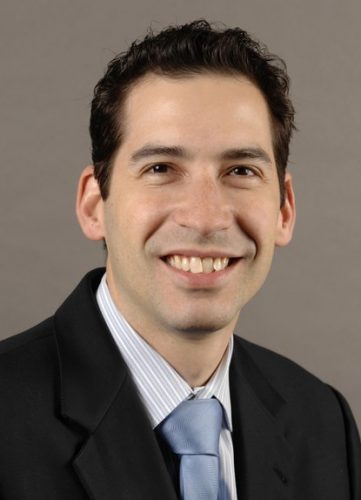
Dr. Michael S. Cohen is a pediatric otolaryngologist who is Director of the Multidisciplinary Pediatric Hearing Loss Clinic at Mass Eye and Ear. He specializes in caring for children with hearing loss and other ear conditions. Dr. Cohen also cares for children with a wide range of ear, nose, and throat problems such as recurrent ear infections, obstructive sleep apnea, recurrent tonsillitis, neck masses, and sinus disease. He sees patients at the Mass Eye and Ear, Main Campus in Boston.
